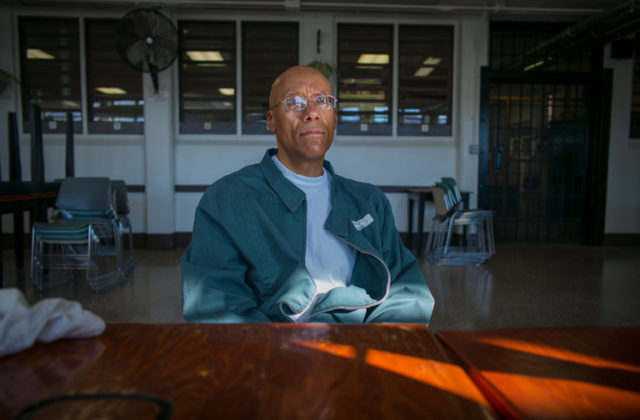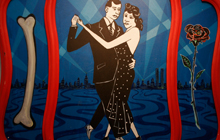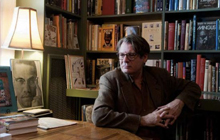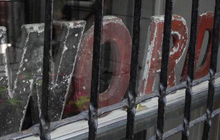Shawshank time and then deported. Dempsey Hawkins.
After 38 years in a US prison, a British born man serving life is sent back to a country he barely knew.
A cold and biting January wind was blowing through Washington DC as I sat in Dulles International Airport awaiting my flight to Britain. Earlier that morning I had been lying on my bed in a New York State maximum security prison cell, fully clothed and waiting for my cell to open one last time. After serving 38 years and 7 months of a 22-year-to-life sentence for committing a so-called crime of passion murder in 1976 when I was 16 and completely blind to many things, including the tenacious nature of regret, the substitute existence that is imprisonment was nearing an end. TS Eliot wrote that to make an end is to actually make a beginning. The end is where we start from.
A little after 6 and still dark outside I heard the guard say, “Hawkins, when I open your cell bring out your linen and towels and put ‘em in the cart at the front of the gallery.” Soon as that cell opened and I stepped out, several of my fellow inmates whispered, “Yo, Hawk, take care of yourself…keep your head up…” I felt lightheaded. Felt the way you feel when you rise from the dentist’s chair after having been in a drug induced state. The sense of surrealism was visceral. I had come to prison in May 1978 and after nearly 40 years spent dreaming of freedom, after decades spent opening my eyes to the ringing of a bell and thinking each dawn I die, I was, incredibly, about to walk out of prison.
Given that I was born in London yet grew up in the US, I had been ordered deported following a 1996 law stipulating that any foreign born person convicted of a violent offence was subject to removal. So it was I found myself walking through Dulles Airport in late January with $200, several items of clothing, and vague expectations of what life would hold for me in England after spending most of my life jailed in America.
Sitting in the airport amidst the sounds of high heels on hard flooring, children’s laughter, and departure announcements, I was alert, attuned, and fully attentive. Yet strangely, I also felt groggy, semi-conscious, and somewhat detached from the people pulling suitcases behind them, talking on cellphones, and hurrying along with cups of coffee in hand. I understood that the feeling of sleepiness was a result of my lengthy incarceration. In many ways one sort of dies to life in prison. Falls asleep at the wheel you might say.
In one respect imprisonment is akin to being in the crow’s nest of a whale ship. Although your job is to stay alert and remain vigilant, these imperatives fail as you begin to daydream and time flows on and on like the miles upon miles of blue, undulating sea beneath you. In prison as in the crow’s nest time advances with its ceaseless march forward. So much so that you easily forget what time of what day it is. The 24 hour intervals seemingly become an unbroken continuum of nothingness. Day turns into night, Sun into moon, yin into yang. And there you are, in the prison of your crow’s nest. On the lookout for whales, yet unable to see anything save your own flights of fancy because you’ve become hypnotised by the glaring brightness of the Sun, the endless sweep of ocean, and your innumerable memories of another day. The whale ship and the prison rocks you to a deep sleep like a baby in a cradle.
And such was the feeling I had awaiting my flight across the Atlantic. Fighting to regain wakefulness while desperately trying to visualize freedom in a new and unknown world.
II
Several hours out of prison and seated on a United Airlines flight from Washington, DC to London, I couldn’t help but reflect on the life I was leaving. Couldn’t help but look through the years and see the images and events of a lifetime of incarceration. Couldn’t leave it all behind me just yet. I was finally detached, yet still attached. I felt the way an animal must when it escapes a trap only to discover that it has left a piece of itself behind. The plane’s engines fired up and the aircraft began to roll down the runway. I looked out the window and saw blue lights flashing by on the side of the tarmac. I also saw yesterday.
Slow motion. I was walking around the prison yard for the last time in a slow, meditative walk. Seemingly keeping pace with the mass of gray clouds drifting above me. Spent nearly forty years in yards like these. Thirty-eight years, to be exact. Straight, no chaser. Since I would be on a plane to Britain the next day, I thought I would spin the yard one last time. One last time confined by high concrete walls with their manned gun towers watching over an expanse of black asphalt that was as hard and cracked as some of the guys who have been walking over it since time out of mind. One last time past the weight pit, the handball court, and the weathered wooden benches where I sat many a hot summer’s day and cold winter’s night and the two seasons in between talking and laughing and shouting and arguing about the meaningful and meaningless.
I basically grew up in the prison yard. Entered it at eighteen, leaving it at fifty-seven. Seen a lot and heard just as much through all the years I had desired and wished to be elsewhere in the world. I could have been released from prison a year earlier, but I had court cases pending against the New York State Parole Board. Court cases that I eventually won and in so doing, established case law that would help others in the years ahead fight a wildly corrupt parole system.
I gained a measure of celebrity and an ocean of respect by waging and winning those court battles. Guys knew I wasn’t just fighting for myself, but for every man and woman in every New York State prison mandated to face the parole board. Legal briefs, legal mail, notaries, telephone conferences, legal visits, court appearances, the filing of this motion, the submittal of that rebuttal, and all the small and large foreseen and unforeseen variables of major litigation in between.
Nothing came easy during that legal war, which was actually a firestorm of accusation and counter-accusation. Yet when the smoke finally cleared the parole board stood exposed as an agency mired in fraud, racism and backroom dealing the likes of which would impress Satan himself. From those two court victories truth and justice emerged side by side to formally announce that all questions had been answered, all doubts erased. The mighty Board had been vanquished. Left torn, ragged, and as silent as a scarecrow caught in a strong wind round midnight.
Snow started to fall as I began walking out the yard. An inmate who was talking on one of the several landline telephones lining the brick wall put the receiver to his chest as he watched me leave and shouted, “Take care of yourself!” More than anything else I felt relief over my pending release. Relieved that I was free of the ball and chain. Free of the absurdity and indignity, as well as the raw brutality. I felt extremely fortunate to have made it out alive, especially since there were times I wasn’t sure I would.
The pilot began assuring the passengers of a relatively smooth flight to London, which would take approximately seven hours. I looked around the dimly lit cabin to see people fluffing up pillows, staring at mobile devices, adjusting seat-back video screens and talking to seat mates. I thought one white haired man was laughing at nothing in particular until I noticed a wire hanging from his ear. The wire hung in the form of a smile that assured me I had much to learn about modern technology. Looking at my fellow travelers settle themselves, I wondered about their reasons for going to England. I also reflected on the moment that made my journey with them possible.
I don’t recall the month but in 2013 I was leafing through a magazine with my headphones on when I decided to stand and stretch. Removing my headphones I turned toward the door and saw Jihad, a short, slight always angry and rebellious guy, walking by with his garbage can that held a New York Times newspaper. I asked Jihad for the paper, and as I read it that night I came across an op-ed essay written by an American University law professor who had been an attorney in the Bush Jr. White House. Wondering if the professor could help me fight the parole board, I wrote and explained my situation. I never heard from her.
Instead I received a letter from an attorney in New York saying my letter had been referred to her. That New York attorney eventually became my advocate and close friend and led a team of fantastic legal minds who litigated my release. Only because I decided to stand and stretch at a particular moment did I meet a lawyer who seemingly appeared by my side like a mythical princess out of a just as mythical forest. When my fellow inmates thanked me for the court victories, they were actually thanking the princess. The warrior princess, to be precise. She was the intellectual force of nature capable of turning the ordinary into the extraordinary by devising a legal strategy potent enough to explode into the kind of case law that is just as good as possessing the key to the front door.
The plane cleared the runway and climbed into the wintry sky over the nation’s capital while stewardesses began handing out food, beverages and small talk. I was returning to London for the first time since the 1960s. I imagined the city had changed somewhat since then but I was still thinking about my past, reliving the past. Schopenhauer said that life is lived forward but must be understood backward. I wasn’t so much as sitting on that jet plane bound for Europe trying to understand my past as I was desperately wishing it were different.
1977. Nearly a year after I had committed and concealed my crime, I left New York to live with my father in Southern Illinois. Went there to hide. Went there in an attempt to distance myself from the destruction I had wrought. In essence I was trying to run from guilt and regret. Making a grand attempt to out distance those shadow demons I had unknowingly unleashed into the rest of my life, the self-making a futile attempt to escape the self. Think of Shelley’s monster, Coleridge’s Ancient Mariner.
In the rural town in which my father grew up and still lived I enrolled in the local high school, made new friends, and sought to disappear amid grazing cows, crowing roosters, and old gray barns sitting weathered and enduring in their alliance with earth and sky. Tried hard to settle into that sleepy town but the effort was futile. I was unable to quell the premonition that my crime would find me. And it did.
On a Sunday afternoon in March 1978 the phone rang. I walked into the living room, picked up the receiver and heard my mother’s voice. She had called to tell me the police were questioning my friends about a murder and asked if I had anything to do with the crime. My heart raced and I steadied my voice. “No,” I softly answered. We spoke a moment longer before I slowly replaced the receiver with a wet hand.
I stood and stared out the window while the distress, the anguish, the pain in my mother’s voice lingered in my ear like the immensity of all the world’s seas booming in the pink hollow of a single shell. I continued to stare out the window until I saw a day when my friends and I were in the back of a furniture store in the Staten Island Mall, sunk low in leather recliners with our only our sneakers visible on the raised footrests. We each held an ice-cream cone and were talking a mile a minute and laughing our heads off because we were young and silly and as carefree as bluebirds in spring.
I desperately tried to comprehend how I had lost that day and found the one in which I stood immobilized by fear and wildly wishing I could resurrect life through the alchemy of guilt and regret. The house was quiet save the languid tick…tick…tick of the wall clock suspending, bending, extending time forward and backward, illuminating the past and compromising my ability to think in the present. The day had faded into orange dusk, continued to fade into bruised purple layers of twilight, into the blackness of night, and on further into the endless midnight of lament.
It was a sunny morning in London as my flight neared Heathrow Airport. I was as close to being completely free as I had ever been since the 1970s. Anticipating what life would be like in Britain after decades of imprisonment in America, I began tying my shoes. I didn’t sleep like most of the passengers, I just untied my shoes, and thought. Mostly about my crime. About how I had deluded myself into believing the irrational was in fact rational. The plane bounced as its wheels hit the tarmac and I remembered something I’d read once. A few words that came to mind as the plane rolled to a stop. “The most confused you will ever get is when you try to convince your heart and spirit of something your mind knows is a lie.”

 Jumel Terrace B&B
Jumel Terrace B&B Life Turns Man Up & Down
Life Turns Man Up & Down The Private Library
The Private Library
I was born and raised in the small town in Southern Illinois that Dempsey retreated to back in 70’s. I was friends with his younger half brother. My dad was friendly with his dad and my grandfather with his.
I can remember when Dempsey came as well as when he left. At the time he thought he would return within a couple of weeks. Little did his classmates know that he would never make that return trip.
He has become a great writer. Many of his relatives on his fathers side were teachers, thinkers. So I like to think he received some of his ability from them.
His dad and grandparents have long since passed. And most of his classmates have followed Dempsey’s path out of town. Just this past week his younger brother Mark passed away at the age of 55.
I hope he is able to make a life for himself in England. I also wonder if he was informed of his brothers death. Perhaps someone who is in contact with him from this site can check to see.
Sincerely
Todd Hatfield